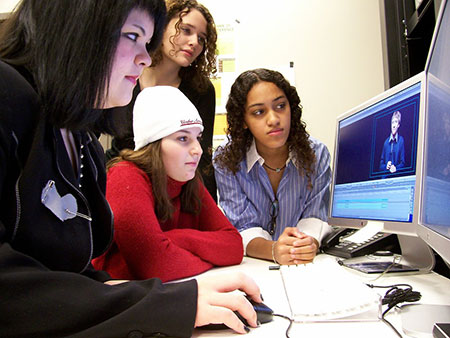A series on President Pelton’s five commitments
EDITOR’S NOTE: President Pelton, in his September 14 inaugural address, outlined five specific measures that he believes will move Emerson from “excellent to extraordinary”— establishing the College as the world’s leading institution of higher education in the arts and communication. The measures are: to raise the bar of academic excellence; to innovate; to extend the College’s reach globally; to engage and assist nearby communities; and to ensure sound financial stewardship. In this five-part series, we will address one measure each day. Below is an excerpt on innovation from President Pelton’s inaugural address:

Our second commitment is to advance innovation. For more than a decade, Emerson has promised that we “[bring] innovation to communication and the arts.”
To live up to that promise, we will establish an Office of Enterprise Development and Innovation whose purpose will be to reduce our heavy dependence on tuition through new sources of revenue, better leverage our existing resources, and create new innovative programs that add value to our core mission.
We will also establish a creative laboratory to develop new works and new products. The lab will provide funding, resource support, advising, and space for faculty and students to develop and advance their good ideas and will complement our already highly successful Emerson Experience in Entrepreneurship program. Participants will be selected on a competitive basis by a committee of faculty, students, and professionals.
The time also has arrived for Emerson to explore thoughtfully how we might use online instructional technology to our advantage, while ensuring that we maintain the highest standards of academic excellence and individualized attention that have characterized our student–centered learning environment.
Since the end of World War II, institutions such as ours—for very good pedagogic and mission-critical reasons—have resisted wholesale changes to how we deliver instruction and build learning communities.
However, as a smart French philosopher once said, “The future is not what it used to be.”
Today, it is undeniable that higher education has reached a tipping point in online instruction. EdX, the high–profile online partnership involving Harvard, MIT, and UC Berkeley, is a game changer. It has already begun to influence how higher education thinks about online instruction. It will quicken the adoption of online instruction in all sectors of higher education.
Emerson has already established eight online courses, three of which are credit bearing. Now is the time for us to consider expanding our current offerings, especially those designed principally for non-matriculated learners.
I am pleased to announce that recently we have had initial discussions with Berklee College of Music to create an online instructional partnership. Berklee established its online program ten years ago. It currently offers more than 130 courses in music production, business and theory, as well as song writing, arranging, and voice. More than 10,000 students enrolled in Berklee online courses last year.
An Emerson–Berklee technology partnership would extend the reach of Emerson’s educational excellence to a global audience with an educational partner who shares our values and has already achieved notable success in this area. Emerson and Berklee are both distinctive institutions with great futures, and I believe that our partnership will be synergistically powerful, providing each of us with advantages that we might not reasonably be able to achieve on our own.
The Emerson–Berklee partnership, which could do for the humanities, in the arts, communication, and music disciplines, what edX has done for online education in science, technology, engineering, and math, will be financially sustainable and financially beneficial, as well.
Of course, our initial discussions cannot go further without the benefit of significant faculty involvement—a process that I will begin as soon as possible.
Categories